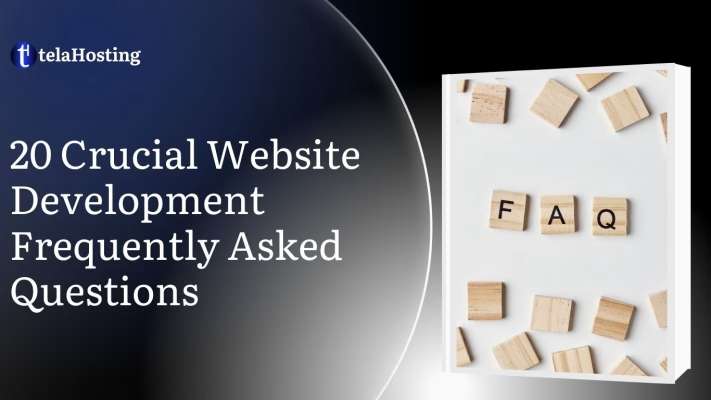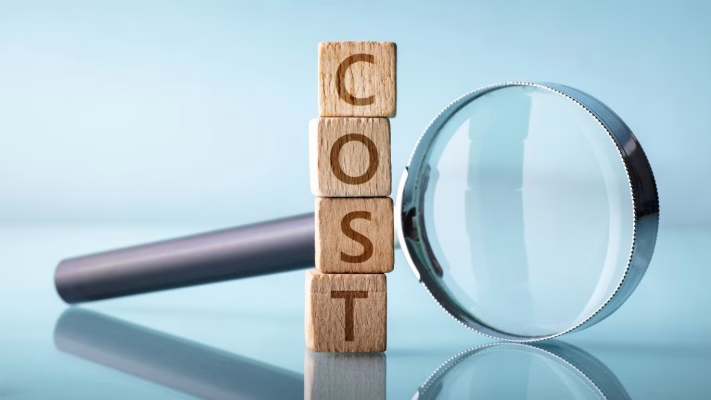
Website development can be confusing and overwhelming, especially for beginners. From choosing the right platform to understanding hosting, security, and maintenance, there are so many questions that come up.
At telaHosting, we understand that website development comes with a lot of questions and confusion, especially for beginners. That’s why we’ve put together this detailed frequently asked questions guide to answer some of the most common questions about website development.
By the end of this guide, you’ll have a clear understanding of how websites work, how to build one, and how to keep it running smoothly. Let’s get started!
Website Development: 20 Frequently Asked Questions Answered
1. What Is Website Development?
Website development refers to the process of creating, designing, and maintaining a website. It involves everything from writing code and structuring the website to choosing the right hosting and ensuring security.
Website development is divided into two main categories:
- Front-End Development: This is the part of the website that users interact with, including the layout, colors, fonts, and buttons. Technologies like HTML, CSS, and JavaScript are commonly used.
- Back-End Development: This involves the server-side operations that run behind the scenes, such as databases, security, and server configurations. Programming languages like PHP, Python, and Node.js are used for this.
If you’re using a website builder like WordPress, Wix, or Shopify, a lot of the development work is already done for you, making it easier to create a website without coding.
2. Do I Need to Know How to Code to Build a Website?
No, you don’t need to be a programmer to build a website. With modern website builders, you can create a website using drag-and-drop tools, pre-made templates, and easy-to-use interfaces.
However, if you want a fully customized website with unique features, learning basic coding languages like HTML, CSS, and JavaScript can be useful. You can also hire a web developer to build a custom website for you.
Options for Building a Website Without Coding:
- WordPress: Easy to use, flexible, and ideal for blogs, business websites, and e-commerce.
- Wix: Drag-and-drop website builder, perfect for beginners.
- Shopify: Best for e-commerce websites with built-in shopping cart features.
If you need help, we at telaHosting offers website development services to create a professional website tailored to your needs.
3. How Much Does It Cost to Develop a Website?

The cost of developing a website depends on several factors, such as the type of website, the platform used, and additional services required.
Breakdown of Website Development Costs:
- Domain Name: ₦5,000 – ₦20,000 per year (e.g., www.example.com).
- Web Hosting: ₦5,000 – ₦50,000 per month (depends on hosting type).
- Website Builder (if needed): ₦5,000 – ₦30,000 per month (e.g., Wix, Shopify).
- Web Design & website Development: ₦100,000 – ₦1,000,000+ (if hiring a professional developer).
- Maintenance & Security: ₦10,000 – ₦50,000 per month (ongoing costs).
If you’re on a budget, you can use affordable hosting from telaHosting and choose a free WordPress theme to get started.
4. What Is Web Hosting and Why Do I Need It?

Web hosting is the service that stores your website’s files and makes them accessible on the internet. Without web hosting, your website cannot be accessed by visitors.
Types of Web Hosting:
- Shared Hosting: Affordable, but shares server resources with other websites.
- VPS Hosting: Offers more control and performance than shared hosting.
- Dedicated Hosting: You get your own private server (best for large websites).
- Cloud Hosting: Scalable and flexible, great for growing businesses.
At telaHosting, we provide secure, fast, and reliable hosting to keep your website online 24/7.
5. How Long Does It Take to Build a Website?
The time it takes to build a website depends on its complexity, design, and content.
Estimated Timeframes for Different Websites:
- Basic Website (Personal or Blog): 1 – 3 days using a website builder.
- Business Website (Small or Medium Business): 1 – 2 weeks.
- E-commerce Store: 3 – 6 weeks (depends on number of products).
- Custom-Built Website: 1 – 3 months (if hiring a developer).
With telaHosting’s website development services, we can help you build and launch your website quickly.
6. What Is the Best Platform for Building a Website?
The best platform depends on your business needs and technical skills.
Comparison of Website Platforms:
- WordPress: Best for blogs, business websites, and e-commerce (highly customizable).
- Wix: Best for beginners who want an easy drag-and-drop builder.
- Shopify: Perfect for online stores with built-in payment and shipping options.
- Joomla & Drupal: More advanced platforms for complex websites.
WordPress is the most popular platform. You can also check this post to understand the differences between the platforms: WordPress vs Joomla vs Drupal: Choosing the Best CMS
7. How Can I Make My Website Mobile-Friendly?

Since 60% of internet users browse on mobile devices, a mobile-friendly website is essential.
How to Make Your Website Mobile-Friendly:
- Choose a responsive design that adapts to all screen sizes.
- Use large, readable fonts and simple navigation.
- Optimize images for faster loading speeds.
- Avoid flash and unnecessary pop-ups.
- Test your website on different devices.
A mobile-friendly website improves SEO rankings and user experience.
8. How Do I Secure My Website from Hackers?
Cybersecurity is critical for protecting your website and user data.
Website Security Best Practices:
- Install an SSL Certificate: Encrypts data and builds trust.
- Use strong passwords and enable two-factor authentication.
- Keep software, plugins, and themes updated.
- Regularly backup your website in case of an attack.
- Install security plugins like Wordfence or Sucuri.
At telaHosting, we offer secure hosting solutions to keep your website protected.
9. What Is SEO and Why Does It Matter?
SEO (Search Engine Optimization) helps your website rank higher on Google, leading to more traffic and potential customers.
SEO Best Practices:
- Use relevant keywords in your content.
- Optimize website speed and mobile usability.
- Get backlinks from reputable websites.
- Regularly update content with high-quality blog posts.
Without SEO, your website won’t get much visibility online.
10. How Often Should I Update My Website?
A website should be regularly updated to keep it relevant and secure.
When to Update Your Website:
- Content Updates: Add new blogs, products, or services frequently.
- Security Updates: Update software and plugins to prevent hacking.
- Design Updates: Refresh the look of your website every 2-3 years.
Keeping your website updated ensures better security, performance, and user engagement.
11. Can I Build a Website for Free?
Yes, you can build a website for free using platforms like WordPress.com, Wix, and Blogger, but free websites have limitations.
Downsides of Free Websites:
- Limited customization options and templates.
- Free domain name with branding (e.g., wix.com instead of yourname.com).
- Ads from the platform on your site.
- Limited storage and bandwidth.
If you want a professional website, it’s better to invest in a custom domain and affordable hosting from telaHosting.
12. What Pages Should Every Website Have?
Every website should have essential pages to provide visitors with the right information.
Must-Have Pages for a Website:
- Home Page: The first impression of your website.
- About Page: Explains who you are and what you do.
- Services/Products Page: Showcases your offerings.
- Contact Page: Includes your phone number, email, and contact form.
- Privacy Policy Page: Required for websites collecting user data.
- Blog Page (optional): Helps with SEO and content marketing.
Adding these pages ensures a complete and user-friendly website.
13. How Can I Monetize My Website?
If you want to earn money from your website, there are several ways to monetize it:
- Selling Products or Services: Set up an e-commerce store.
- Affiliate Marketing: Promote products and earn commissions.
- Google AdSense & Ads: Earn from displaying ads on your site.
- Membership & Subscription Fees: Offer exclusive content for paying members.
- Sponsored Content: Charge businesses to feature their content.
With telaHosting’s secure hosting, you can easily set up a revenue-generating website.
14. What Is a Domain Name and How Do I Choose One?
A domain name is your website’s unique address (e.g., www.yourbusiness.com). Choosing a domain name is important for branding and SEO.
Tips for Choosing a Good Domain Name:
- Keep it short and memorable (avoid long or complicated names).
- Use .com, .ng, or .net for professional credibility.
- Avoid numbers and hyphens (they make it harder to remember).
- Check domain availability on telaHosting before finalizing.
A strong domain name helps with branding and user trust.
15. What Is the Difference Between a Website and a Web Application?
A website is a collection of pages designed for information sharing, while a web application allows users to interact with data and perform tasks.
Key Differences:
Website:
- Primarily for information (e.g., blogs, company pages).
- Static content that updates periodically.
- Visitors consume content but don’t interact much.
Web Application:
- Interactive and dynamic (e.g., Facebook, Gmail, banking apps).
- Requires user authentication (logins, dashboards, etc.).
- Users perform specific functions (e.g., booking tickets, sending emails).
If you need a custom web application, our developers at telaHosting can help.
17. What Is a CMS and Which One Should I Use?
A Content Management System (CMS) allows you to create, edit, and manage website content without coding.
Best CMS Options:
- WordPress: Best for blogs, business sites, and e-commerce (most popular).
- Joomla: More advanced features but steeper learning curve.
- Drupal: Powerful but requires technical knowledge.
- Shopify: Best for e-commerce stores.
WordPress is the top choice for most websites due to its flexibility and ease of use.
18. Can I Connect Social Media to My Website?
Yes! Connecting social media to your website boosts engagement and visibility.
How to Integrate Social Media with Your Website:
- Add social media buttons (Facebook, Instagram, Twitter, etc.).
- Embed social media feeds (display recent posts).
- Enable social sharing (let visitors share content easily).
- Use Facebook Pixel & Google Analytics to track user behavior.
This helps you reach a larger audience and drive traffic to your site.
19. What Is Website Maintenance and Why Is It Important?
Website maintenance involves regular updates, security checks, and performance optimizations to keep your site running smoothly.
Why Website Maintenance Matters:
- Prevents security threats and hacking.
- Fixes broken links and outdated content.
- Ensures website speed and smooth performance.
- Keeps user experience fresh and engaging.
Ignoring maintenance can lead to slow speeds, security risks, and poor rankings.
20. Do I Need a Privacy Policy for My Website?
Yes! If your website collects user data, a privacy policy is legally required.
Why a Privacy Policy Is Important:
- Protects user information (emails, payment details, etc.).
- Required by law (GDPR, CCPA).
- Builds trust with visitors.
If you collect customer data, make sure to include a privacy policy page on your website.
Final Thoughts
Building and maintaining a website doesn’t have to be difficult. With the right tools, guidance, and telaHosting’s expert support, you can create a fast, secure, and successful website in no time.
Need help? Contact telaHosting today and let’s get your website online!